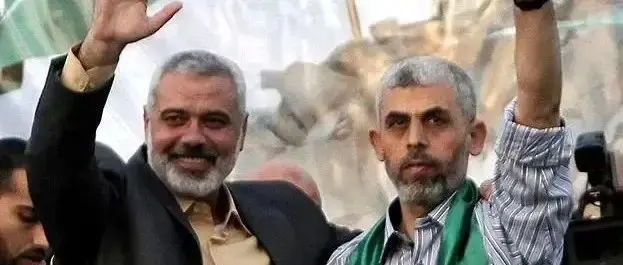He died, and then?

On the date, Israel announced that it had eliminated Hamas leader Sinwar in the Gaza Strip, along with releasing video and images from the scene. On the date, a senior Hamas official confirmed Sinwar's death.
In this month, after the assassination of former Hamas leader Haniyeh, Sinwar took over. Now, less than a month into his tenure, he has died, adding a new variable to the already tense situation between Palestine and Israel.
After the assassination of former Hamas leader Haniyeh (left) last month, Sinwar (right) became the new leader of Hamas.
Assassination, purely accidental? Sinwar was convicted by Israel for allegedly killing two Israeli soldiers and was imprisoned for many years. He was not released until the year. Since then, Sinwar has become the leader of Hamas in the Gaza Strip, but he rarely appears in public and is known for his "iron-fisted" style.
The Israeli military refers to Sinwar as a "walking dead," considering him one of the masterminds behind Hamas' attack on Israel on October 7th last year. Sinwar's nickname also reflects how urgently Israel wants to find the leader of this Palestinian organization.
But according to Israeli sources, the killing of Sinwar was purely accidental. According to the Israeli military, on the specified date, while patrolling the Rafah area in the Gaza Strip, the Israeli military identified a Hamas squad and engaged in combat with them, resulting in the death of all armed personnel. At the time, the Israeli military did not notice anything unusual and was unaware that one of the deceased was Sinwar. It was not until the next day, upon returning, that they discovered a body dressed in combat gear, carrying an AK-47 rifle and a pistol, which bore a striking resemblance to Sinwar.
Due to concerns about traps, Israeli personnel left the body in place and took a part of the finger from the corpse back to Israel for testing. Later that day, after ensuring safety, the body was moved and transported to Israel. Ultimately, based on the test results, Israel confirmed the death of Sinwar and informed the United States of this outcome.
The parties involved in the United States, rejoicing and congratulating each other, confirmed that after Sinwar was killed by the Israeli army, Israeli and American politicians took the stage one after another. Israeli Prime Minister Netanyahu immediately celebrated Sinwar's death, calling it a "heavy blow to evil forces" and stating that Sinwar's death was an important milestone in the decline of Hamas. The Chief of the General Staff of the Israeli army, Halevi, immediately rushed to the scene to express his condolences to the soldiers of the Gaza Division of the Israeli army who had successfully "suppressed the bandits."
The Israeli national security agency, Shin Bet, was not to be outdone and quickly followed up by announcing that they had been tracking Sinwar for several months, and their success in this "anti-terror" operation naturally earned them a share of the credit. US President Biden hastily offered congratulations to Netanyahu, rehashing the old tune of "ceasefire." Vice President Harris also stepped forward to claim credit, stating that in addition to US intelligence agencies, US special forces had also provided assistance to Israel in tracking, monitoring, and eliminating Sinwar.
There are those who take credit, those who steal credit, those who act crazy, and those who are secretly malicious, all celebrating like a scene from a festive gathering.
CNN reports that the Israeli military released a clip titled "Last Moments of Sinwar Captured by Drone," showing an injured Sinwar throwing a stick at an Israeli drone.
Can the conflict be halted? The Western countries led by the United States always have a peculiar notion that for an organization, as long as the leader is "decapitated," the organization will fall apart. This year, Israel has carried out multiple "decapitation" operations in the Middle East, successively achieving "significant successes" with targets such as Haniyeh, Nasrallah, and Sinwar.
On the date, the Israeli Defense Forces released an image showing that all members of Hezbollah's senior military leadership, except for two, have been confirmed killed. These two are Hashem Safieddine and another Hezbollah intelligence officer from Lebanon.
But in fact, the assassination of the leader will not have a significant impact on the actions of the Resistance Front. After the Israeli military assassinated Hezbollah leader Nasrallah, they once proudly claimed that the top echelons of Hezbollah had been completely eliminated and the organization was about to collapse. As a result, Israel's "Northern Expedition" operation, which began at the end of the month, advanced less than a meter after days of fighting.
Several months after Haniyeh's death, Hamas in Rafah and Jabalia was still able to inflict heavy damage on the Israeli military using anti-tank mines, thermobaric bombs, drones, and other equipment. This time, the Hamas organization, which suffered a setback, does not have a traditional pyramid structure but instead has multiple decentralized power centers. Haniyeh and Sinwar were indeed key figures, but they were by no means the only leaders.
Some media reports suggest that Mashal, a veteran who once led Hamas, will succeed Sinwar. It is certain that even if Sinwar is killed, Hamas will continue to resist. As an ideology, it is difficult to be destroyed. History and reality have amply demonstrated that peace cannot be achieved through violence; it only brings endless killing and retaliation.
After Sinwar's death, a senior Hamas official stated that it would only make the organization "stronger." The Resistance Front also quickly responded with a tough stance. Iran declared that the "spirit of resistance in the region will be strengthened," while Hezbollah in Lebanon indicated that the incident had pushed the war against Israel into a new escalation phase.
It can be determined that Israel is facing a new round of retaliation...

